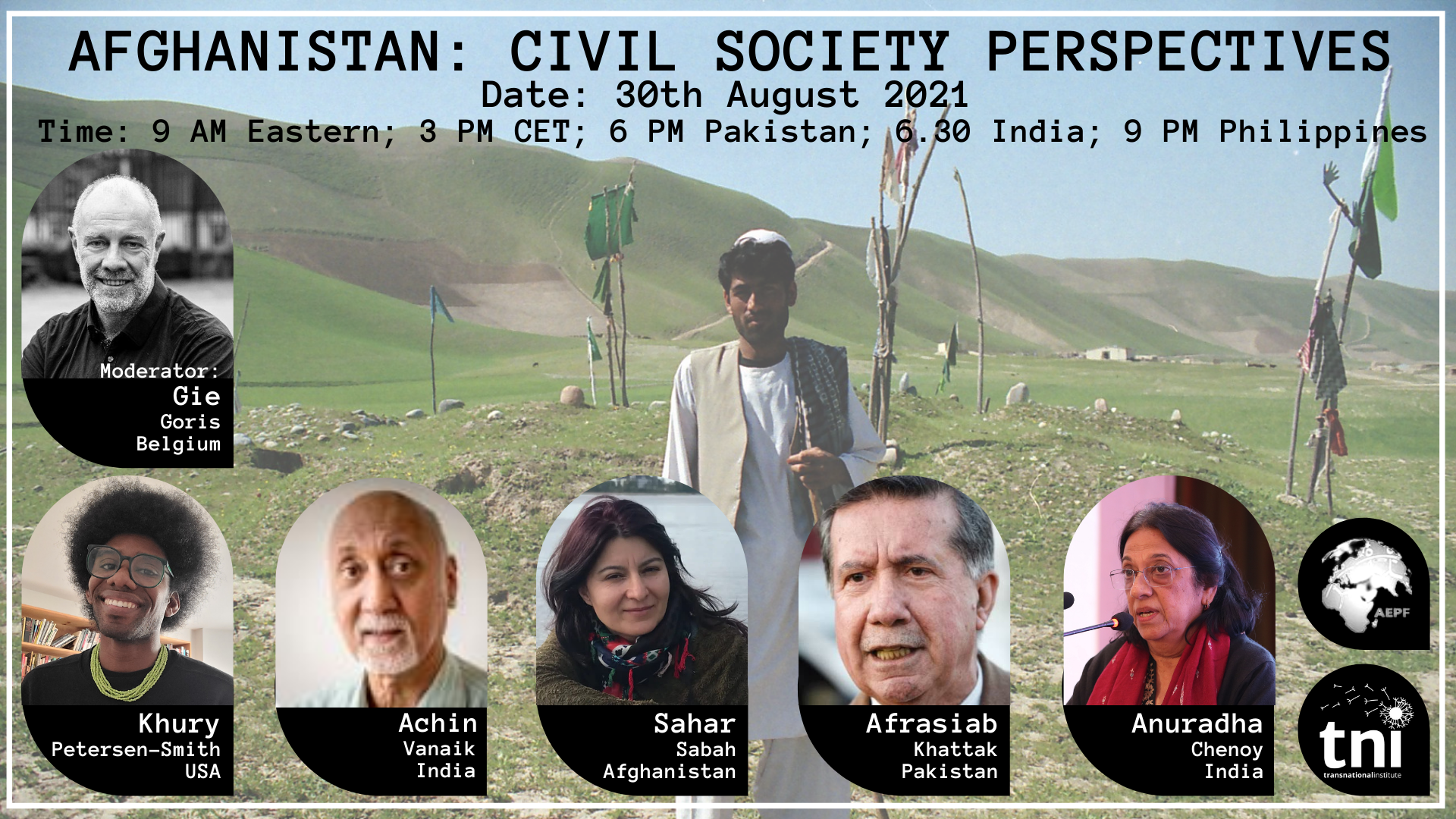Register for two important webinars on Afghanistan and Chile
Was this forwarded to you? Sign up here.
|
|
|
Dear reader,
In the coming weeks TNI will co-host two unmissable webinars. On 30 August, international experts will discuss the crisis in Afghanistan and an international civil society response. Then on September 22, we hear from a panel of specialists on the Constitutional Process in Chile and what it means for a democracy in times of crisis. Full details below.
|
|
|
Webinar 30 August - Afghanistan: Civil Society Perspectives

The US spent two trillion dollars on the 20-year-long war in Afghanistan, where less than 2% went to the Afghan people, 98% to troops (US troops 88%, Afghan security forces 10%). Casualties as of April 2021 include between 48,000 and 72,000 civilians, 72 journalists, 444 aid workers, 66,000 Afghan soldiers, 2,445 US troops, and thousands wounded. Further, 2.7 million became refugees and 4 million have been internally displaced and the indignity, impoverishment, unemployment, rape, trauma and corruption suffered by countless others. $ 88 billion was spent on training the 300,000 Afghan soldiers and the huge amount of military equipment that is now left in the hands of the Taliban, who have happily inherited the latest weaponry, including at least 167 aircraft, according to an AP Report.
Following the total reconquest of the country by the Taliban, what can be done to improve the humanitarian condition of Afghan society, especially for women, children, the elderly and wounded, minorities and others historically targeted by the Taliban? Can super powers and regional players eschew their geostrategic desires and instead put in place a humanitarian and human security approach to Afghanistan?
Monday 30 August at 15:00 CET
The webinar will be held in English.
We will discuss the aforementioned questions, in the context of the measures proposed by 17 UN Rapporteurs to address the situation.
Speakers
- Khury Petersen-Smith, Fellow of Institute for Policy Studies, Washington and researches U.S. empire, borders, and migration.
- Achin Vanaik, Fellow at TNI, writer, social activist and retired Professor, University of Delhi.
- Sahar Saba, Afghan women’s rights activist and former spokesperson for Revolutionary Afghan Women’s Association.
- Afrasiab Khattak, former Senator and former Chairperson Pakistan Human Rights Commission.
- Anuradha Chenoy, former Dean and Retired Professor, School of International Studies, Jawaharlal Nehru University.
Moderator: Gie Goris, Belgian journalist and author who has covered Afghanistan for more than two decades.
This webinar is organised by the Transnational Institute and the Asia Europe People's Forum (AEPF).
|
|
|
Webinar 22 September - The Constitutional Process in Chile: What does it mean for a democracy in times of crisis?
Photo credit: Felvalen (CC BY-SA 4.0)
October 2019, marked a milestone in Chile’s future. After almost three decades of consecutive governments that simply managed the economic and political models inherited from the civic-military dictatorship (1973-1990), that day High School students lead and called upon Chileans to take a stand against the model behind decades of unsustainable levels of arbitrariness and poverty; job insecurity; market lead education, health and pension systems; and unbridled corruption among politicians, public institutions and private enterprise.
October 2020, plebiscite showed that more than 80% of the Chilean population wanted to bury Augusto Pinochet’s 1980 Constitution, and in May this year, voters chose the members of the Constitutional Assembly that would take on that task. When the Constitutional Assembly officially convened this past July 4th, further steps were taken towards what will be an equal, inclusive and democratic Magna Carta for Chile.
What does a new constitutional process mean for a democracy that finds itself in crisis?
Wednesday 22 September at 16:00 CET
The webinar will be held in English and Spanish.
This international seminar will discuss if it is possible in a state of social and political turmoil to draft a new charter of governing rules. The experiences lived by Bolivia and Ecuador will also be looked into, as both countries went through similar processes in 2006 and 2007, respectively.
Speakers
- Jaime Bassa, Vice President of the Constitutional Convention, Convention member for District 7, Constitutionalist lawyer
- Beatriz Sánchez, Convention member for District 12, Journalist and Chilean politician.
- María Augusta Calle, Journalist and Ecuadorian politician. She was a member of the Constitutional Assembly in Ecuador from 2007 to 2008.
- Andrónico Rodríguez, President of the Senate of the República Plurinacional de Bolivia, and senator for Cochabamba, representing the Movimiento al Socialismo (MAS) party.
Moderator - Christian Reyes, Academic Director of the Universidad Abierta de Recoleta, Chile
This webinar is organised by the Transnational Institute and Universidad Abierta Recoleta. |
|
|
|
|